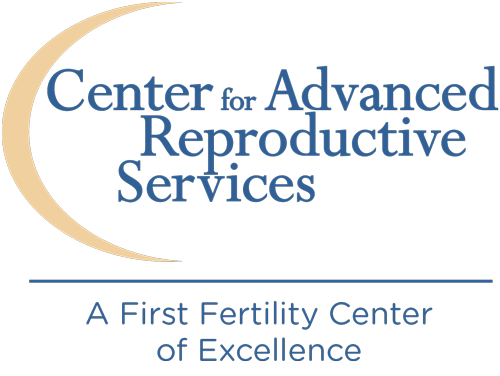- Why Choose Us
Success Stories
Our Facilities
Academics/Research
- Start Your Journey
- Family Building Programs
Integrated Health & Wellness
- News & Video
Video Library
News + Events
Contact Us
- Patient Portal
Online Payments
- For Physicians
The Center for Advanced Reproductive Services is a part of the First Fertility family of centers. Learn More About The Center.
PGT Q&A
What is PGT or PGT-A?
PGT is preimplantation genetic testing. PGT-A is preimplantation genetic testing for aneuploidies. This genetic testing looks for defects in an embryo that would prevent it from implanting, produce a miscarriage or cause an inherited disease.
How does PGT testing work?
PGT is done during in Vitro Fertilization (IVF). As part of that process, multiple eggs and embryos are produced that can be biopsied for genetic testing. The biopsy can be performed at different stages of the embryo’s development.
The earliest way to test embryos for genetic problems is to study their polar bodies. Polar bodies are small cells with a tiny bit of cytoplasm and a nucleus, formed as the egg is maturing. The polar bodies can be removed and studied to determine the maternal genetic contribution to the developing embryo.
Another genetic testing method can be done three days after the egg has been fertilized in the lab. One cell from the eight-cell embryo is removed and its genetic material is tested to identify possible defects.
What types of PGT testing are available?
There are two types of genetic testing available. One technique, the polymerase chain reaction (PCR), produces thousands of copies of a specific DNA fragment. The size of the fragment distinguishes the normal from the abnormal gene.
Another technique, fluorescent in situ hybridization (FISH), uses fluorescent dyes to visualize specific chromosomes. A cell with an abnormal chromosomal set will have a characteristic fluorescent pattern.
The results from the PCR and/or FISH tests are usually available within 24 hours.
When is PGT testing important?
PGT is most commonly performed in 4 different situations, depending on the couple’s or individual’s needs.
History of Genetic Disorders
For couples aware of genetic disorders through family history or based on carrier testing, PGT testing can be performed to help avoid a pregnancy or child born with the specific genetic condition.
In genetic disorders where the genetic mutation is known, such as Cystic Fibrosis or Tay-Sachs disease, the actual genes of the embryo are examined for presence of the condition.
Advanced Maternal Age
Chromosomal abnormalities due to advancing maternal age are more likely to occur in women over the age of 35, leading to problems like Down Syndrome or early miscarriage.
PGT testing can determine the number and character of the chromosomes and determine which embryos are the most likely to result in a healthy, ongoing pregnancy.
Recurrent Miscarriages and Repeated IVF Failure
These two groups of couples have been found to produce a higher proportion of abnormal embryos. Balanced translocation or rearrangement of chromosomes can lead to recurrent miscarriages. PGT testing can determine which eggs and/or embryos are the most likely to result in a healthy pregnancy, screening out the chromosomes that have joined up incorrectly.
Male Factor Infertility
In some cases of severe male factor infertility, a high rate of chromosomal abnormality has been seen in embryos that result from men with azoospermia.
Does PGT cause genetic damage or other damage to the embryos?
No. The polar bodies naturally dissolve at implantation and have no significance after fertilization. With embryo biopsy, the three-day old embryo is unaffected by the removal of one or two cells. Thus far, there has been no increase in the rate of congenital abnormalities or pregnancy complications in patients when embryo biopsy has been done.
Why is PGT important?
PGT is important because the technology holds the promise of reducing the incidence of genetic disease. To date, over 40 life-threatening and debilitating genetic diseases may be screened before embryonic implantation.
PGT also changes reproductive options for families at risk. Parents who have previously given birth to a child with Cystic Fibrosis or Tay-Sachs, for example, now have the option to genetically screen their embryos before pregnancy. Only those embryos that do not possess the disease-causing genes will be implanted.
Most chromosomally abnormal embryos either do not implant or spontaneously abort shortly after implantation. When PGT is used, only normal embryos are transferred into the uterus, giving patients a much better chance of carrying their pregnancy to full-term with healthy babies.
How accurate is PGT testing?
PGT can diagnose genetic defects with approximately 98% accuracy.
Even if a patient undergoes PGT, prenatal testing such as amniocentesis and chorionic villus sampling (CVS) is usually recommended to confirm the PGT diagnosis. Revealing genetic defects before pregnancy can significantly reduce the risk of a fetus being affected.
What ethical concerns does PGT technology present?
Nearly all-pregnant women are offered some form of prenatal screening and diagnosis. Since PGT screens embryos before they are transferred, many believe it can spare couples from the emotionally wrenching ordeal of deciding whether to terminate a second trimester pregnancy if their baby has a genetic disorder.
The Ethics Committee of the American Society of Reproductive Medicine (ASRM) has established ethical guidelines regarding sex selection and PGD. These recommendations do not encourage using PGT for sex selection for non-medical reasons.
What is the future of PGT?
PGT is rapidly advancing with improvements in accuracy and availability. More and more genetic disorders will be able to be diagnosed. New techniques are being developed that will allow all the chromosomes from the embryos to be checked, improving the success rates of IVF.
PGT is an exciting technology that offers couples at risk an alternative to pregnancy termination of an affected fetus. PGT-A of aneuploidy has the potential to decrease miscarriage rates and possibly increase implantation rates.
Further studies are required to demonstrate whether or not patients with repeat IVF failures, recurrent pregnancy loss, and advanced maternal age could benefit from routine application of PGT.
PGT is a promising and important tool in clinical IVF to select embryos with the greatest potential for implantation, maximizing pregnancy outcomes while also reducing the risk of multiple births.


